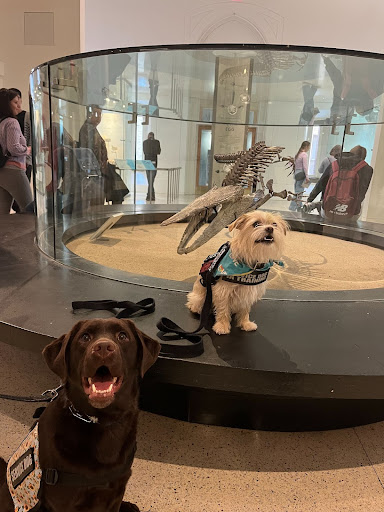It has been proven that over time, animals provide both mental and physical health benefits for many. Service animals have been around since the 1920s and continue to provide comfort to people with disabilities today. St. John’s University students with emotional support or service animals shared their stories in an interview with The Torch.
Senior Isabel Clarke, described the process of bringing her cat, Kirara, with her to campus. “First, you have to get them registered as an emotional support animal,” Clarke said. “Some people have them for depression, or, in my case, anxiety.”
The process begins when a student’s personal therapist — or anyone that can aid with mental health — deems that “an emotional support animal would be beneficial.”

Photo Courtesy / Isabel Clarke
“You go through a Disability Housing screening process, and then you are accepted or not,” Clarke said “After the University gives approval, you have to get your animal all of its shots and an ID. Then, a letter is sent to Disability Services, and you meet with them to discuss the conditions of living.”
According to Clarke, “the process was actually pretty easy — you fill out the application form online and you even get a kit with a chip, ID and collar for your pet.” Clarke’s roommates keep Kirara company, making it easier for Clarke to go to class or work since cats are “not as independent as people think.”
“Emotional support animals can’t go everywhere with you because they aren’t trained like service animals are to go to class with you and comfort you if you need it,” Clarke said. “Emotional support is more leaving your animal in the room to have with you.”
Despite the location restrictions for emotional support animals, Clarke expressed that having her cat in the room has been a beneficial experience overall, especially regarding her anxiety.
Sophomore Gregory Jones described his experience bringing his rabbit, Cloud, to school as an emotional support animal — a similar experience to Clarke’s.
“It wasn’t difficult — I had seen that other people had [an emotional support animal], and I had the idea of getting one for a while,” Jones said. “When I applied, it was pretty simple.”

Photo Courtesy / Gregory Jones
Additionally, Jones described similar sentiments to Clarke about the obligations that come with having an emotional support animal. “He’s sort of like a cat, he can do a lot by himself and he doesn’t make a lot of noise — which is good, so he doesn’t bother anyone. It’s nice to have someone to be responsible for, but he doesn’t take all of my time away from my work.”
Sophomore Sav Smith has a service dog, Bailey, with them on campus. There is a crucial difference between emotional support and service animals, which Smith defines:
“Emotional support animals don’t have to be trained, and they’re only for at-home use — they do not have public access. Service animals are task-trained for a specific disability and they are granted access into public buildings.”
Smith described the process of bringing their service animal to campus, and again, the process seemed smooth. “I just emailed the Office of Disability when I was a freshman, told them I would be on campus and that I am a service dog handler. I didn’t need a vet’s note about shots since I live in my own apartment. They cannot make you prove training because there is no federal or state registry for animals.”
Despite the benefits of service animals, Smith expressed the prejudice they sometimes face when out with Bailey. “I face ableism a lot — I can’t take buses because they don’t let me on with Bailey. I even tried to pursue legal action against the MTA because service animals are supposed to have public access.” However, it is clear to Smith that the process has been worthwhile.

Photo Courtesy / Sav Smith
“She had a natural alert for [my] panic attacks, and so we had her trained to be able to be a service animal since she was 3 months old,” says Smith. “I have autism and a dissociative disorder, and because of her, I can exist more fully. She knows my routine, where I live and even the stop I get off at. Moving here, if I did not have her, I would not have been able to do so.”
Emotional support and service animals on campus have provided comfort to many St. John’s students. To learn more about registering an animal, check out the Office of Disability Services website for the proper forms.









